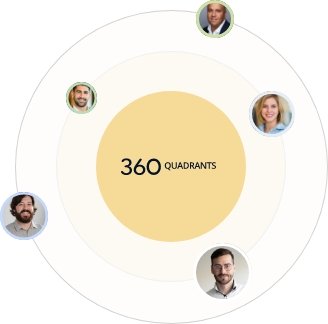Web Application Firewall Software
Web Application Firewall Software (WAF) is an application layer firewall that applies a set of rules to a Hypertext Transfer Protocol (HTTP) conversation that covers application layer attacks, such as Cross-Site Scripting (XSS), Structured Query Language (SQL) injection attacks and application layer Distributed Denial of Service (DDoS), and protects application servers from security breach and loss of critical business information. Web Application Firewall Software (WAF) solutions are deployed ahead of web servers to defend web applications from internal and external threats, control and monitor web applications, and help organizations achieve the compliance requirements.
The competitive landscape analyzes the growth strategies adopted by the key players in the Web Application Firewall Software (WAF) market. Imperva, Akamai, Barracuda, Citrix, Cloudflare, DenyAll, Ergon Informatik, F5 Networks, Fortinet, Penta Security Systems, Radware, Trustwave, Sophos, Positive Technologies, NSFOCUS, StackPath, Zenedge, Qualys, Instart Logic, United Security Providers, Applicure, Sucuri, Brocade, A10 Networks, and SiteLock are recognized as some of the top players in the WAF market. This chapter also includes the MicroQuadrant matrix, which provides information about the 25 major players who offer WAF solutions and services. The vendor evaluations are based on 2 broad categories: strength of product portfolio and business strategy excellence. Each category carries various criteria based on which the vendors have been evaluated. The evaluation criteria considered under strength of product portfolio include breadth and depth of product offering, product feature and functionality, focus on product innovation, product differentiation and impact on customer value, and product quality and reliability. The evaluation criteria considered under business strategy excellence include geographic footprint, breadth of applications/verticals served, channel strategy and fit, and mergers and acquisitions strategy. The products offered by these top players are loaded with many features and capabilities. Additionally, these players have adopted various business strategies to maintain a leading position in the Web Application Firewall Software (WAF) market.
Vendors who fall in this category generally receive high scores for most of the evaluation criteria. They have strong and established product portfolios and a very strong market presence. They provide mature and reputable Web Application Firewall Software (WAF) systems, solutions, and services. They also have strong business strategies. Imperva, Akamai, Citrix, and F5 Networks are the vendors in the visionary leaders category in the MicroQuadrant matrix.
They are established vendors with very strong business strategies. However, they are low in product portfolio. They generally focus on a specific type of technology related to the product. Trustwave, Sophos, Positive Technologies, and Brocade are the vendors in the dynamic differentiators category.
Innovators are the vendors who have demonstrated substantial product innovations as compared to their competitors. They have a much focused product portfolio. However, they do not have very strong growth strategies for their overall business. Barracuda, Cloudflare, Fortinet, StackPath, Zenedge, Applicure, Instart Logic, DenyAll, Radware and SiteLock are the vendors in the innovators category.
They are vendors with niche product offerings and are starting to gain their position in the market. They do not have very strong business strategies as compared to other established vendors. They might be new entrants in the market and require some time before getting a significant traction. NSFOCUS, Ergon Informatik, Penta Security Systems, Qualys, United Security Providers, Sucuri, and A10 Networks are the vendors in this category.
Major Solutions in WAF
The solutions segment is further categorized into hardware appliances, virtual appliances, and cloud-based. Various features offered by WAF solutions include web application attack protection, deployment option, protocol validation, virtual patching, active and passive authentication, Uniform Resource Locator (URL) rewriting, content routing, cookie signing and encryption, DDoS prevention, data leak prevention, and web server and application signature security.
HARDWARE APPLIANCES
Hardware appliances are configured on the local network to protect the network from periphery threats. These Web Application Firewall software are easy to install and are suitable for high-volume sites, which require a high throughput. Physical WAF is a remote network component, hence it can be managed better. It can be easily moved and reconfigured with minimal interference in the network infrastructure. WAF solutions vary depending on the network infrastructure of the enterprise.
The WAF solutions map the virtual cloud resources to the physical ones and control the flow of data to and from the networks. They provide effective protection against web attacks, such as cross-site scripting, SQL injection, forceful browsing, information leakage and improper error handling, cookie poisoning, botnets, and DDoS.
VIRTUAL APPLIANCES
Virtual appliance-based solutions facilitate the deployment of wide-area distributed computing infrastructure. Such solutions run on Windows OS to create a virtual environment that resembles a completely separate computer environment. The WAF security provided by virtual appliances is equivalent to the security provided by hardware appliances. Rapid deployment, a significant feature of the virtual appliances solution, helps in reducing the deployment time. Advanced security, high scalability, elasticity, and greater visibility are some of the features offered by virtual appliances for virtualized and cloud-based environments.
CLOUD-BASED
Cloud-based Web Application Firewall software are available as software bundles, with a full stack of threat prevention technologies that provide the best protection against vulnerabilities, such as malware, phishing, ransomware, and the emerging cyber threats. Cloud-based WAF solutions provide protection and safeguard the network even if users are not on their Virtual Private Network (VPN). They offer capabilities, such as bot detection and enforcement, access control, caching, threat intelligence, Application Programming Interface (API) security, malware detection, and DDoS mitigation. Cloud-based deployment is cost-effective and delivers a better user experience, along with scalability options to safeguard the data. Cloud-based deployment of Web Application Firewall software is said to be gaining pace, due to the increased adoption of cloud computing technology across various organizations.
Best Web Application Firewall (WAF) Software
-
1. Imperva Cloud Application Security Vs F5 Advanced Web Application Firewall (WAF)
 VS
VS
-
2. F5 Advanced Web Application Firewall (WAF) Vs Akamai Web Application Protector
 VS
VS
-
3. Imperva Cloud Application Security Vs Citrix Web App Firewall
 VS
VS
-
4. F5 Advanced Web Application Firewall (WAF) Vs Fortinet Firewalls
 VS
VS
-
5. Imperva Cloud Application Security Vs AppWall by Radware
 VS
VS
 Analysts
Analysts Brocade Virtual Web Application Firewall capitalizes on deployment flexibility with a software-based Web Application Firewall (WAF), which can be used for Network Function Virtualization (NFV). It delivers significant scalability so that organizations can protect major online applications, grouping both within data centers and worldwide cloud platforms. It can be used to apply business guidelines to online circulation, reviewing and stalling attacks such as SQL injection and cross-site scripting (XSS), while cleaning outgoing traffic to cover credit card data, and help attain compliance with PCI-DSS requirements.
TrueShield by Sitelock LLC shields sites from spiteful bot traffic while dropping load time by up to 50% for stationary website content. TrueShield carries dynamic caching and risk protection to website, eliminating attacks before they initiate. TrueShield Premium offers advanced threat protection while increasing site speed.
dotDefender's enhanced security tactic does away the need to learn the exact threats that exist on each web application. The software that runs dotDefender concentrates on investigating the request and the influence it has on the application. Actual web application security is based on the three powerful web application security engines: Pattern Recognition, Session Protection, and Signature Knowledgebase. dotDefender is categorized by an extremely low false positive rate. It offers complete protection against threats to web applications.
The USP Secure Entry Server is a Swiss-made web access administration solution and offers a high-end web application shield, an ultimate authentication feature set, and actual widespread single sign-on competencies - all in a highly-enhanced, accessible, and reasonable all-in-one product set.
Sucuri is a competent security service provider for websites. The cloud-based platform offers comprehensive website security with an antivirus and firewall for websites. The platform monitors security incidents, fixes website hacks, and protects sites to prevent hacking. The platform also ensures that the website runs smoothly and there is no loss of operational productivity.
A10’s Web Security solution protects users from current threats on the internet by leveraging complex security services, leading to tougher enterprise perimeter safety and improved productivity.
The Forcepoint Web Security solution provides the most comprehensive and secure application controls in the web security environment. The web security solution is the best-in-class web security solution and provides 52% greater efficiency. It is combined with advanced features such as enterprise-grade DLP, cloud sandboxing with Advanced Malware Detection (AMD), and perceptibility and control over shadow IT. Only Forcepoint offers license flexibility across deployment states.
Micro Focus Application Defender is a runtime application self-protection (RASP) service through which the user can identify and protect the applications in real-time from attacks and vulnerabilities. The product is easy to install and manages real-time detection and protection to distinguish between an actual attack and genuine request.
Application Gateway and its Web Application Firewall software Protect web requests from web susceptibilities and attacks without alteration to back-end code. An example of Application Gateway can host of up to 100 websites that are protected by a WAP. It monitors attacks against web applications by using a actual WAF log. It is customizable to suit application requirements and eliminates wrong positives.
Oracle Cloud Infrastructure Web Application Firewall Software (WAF) protects all internet-facing endpoints, providing consistent rule enforcement across a customer's applications.


